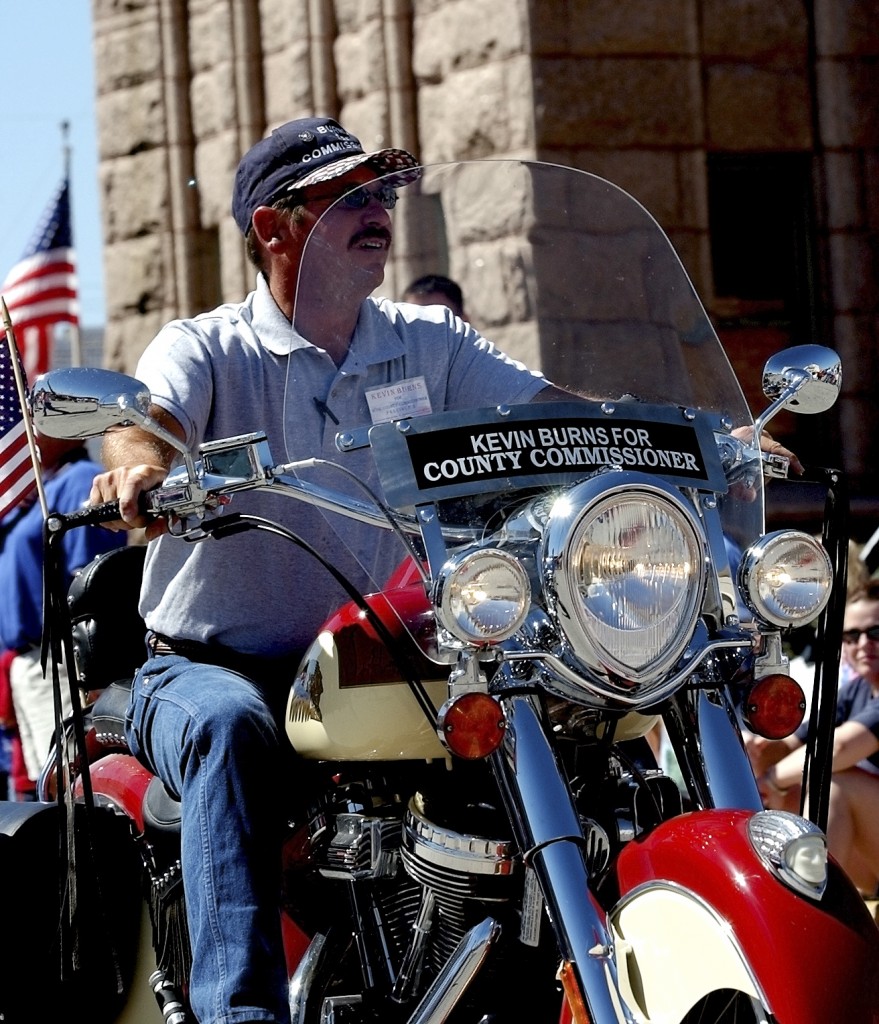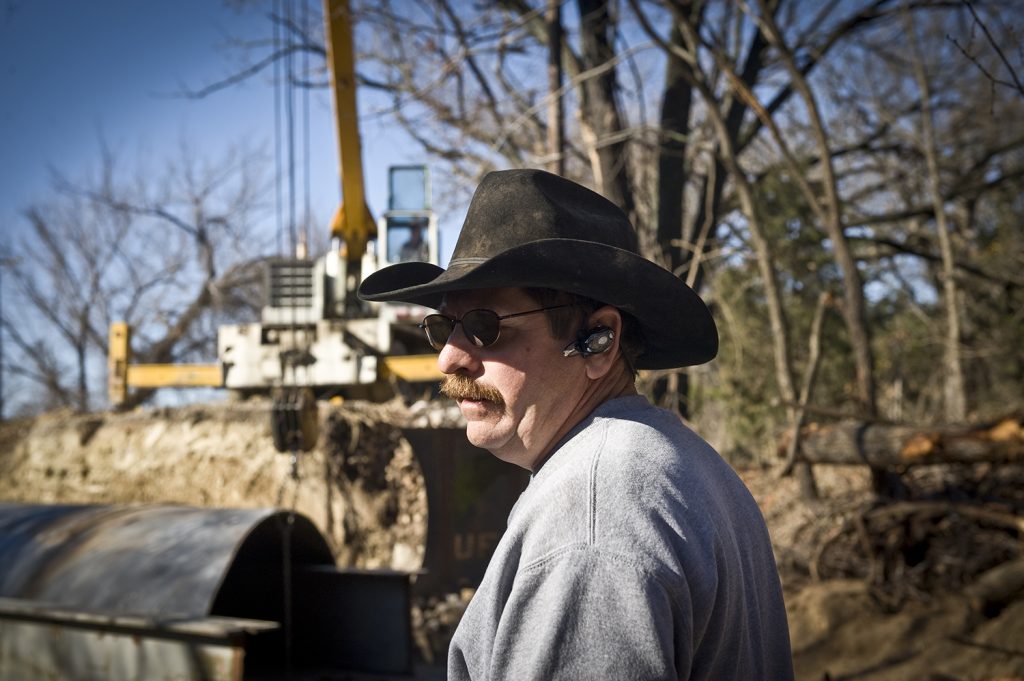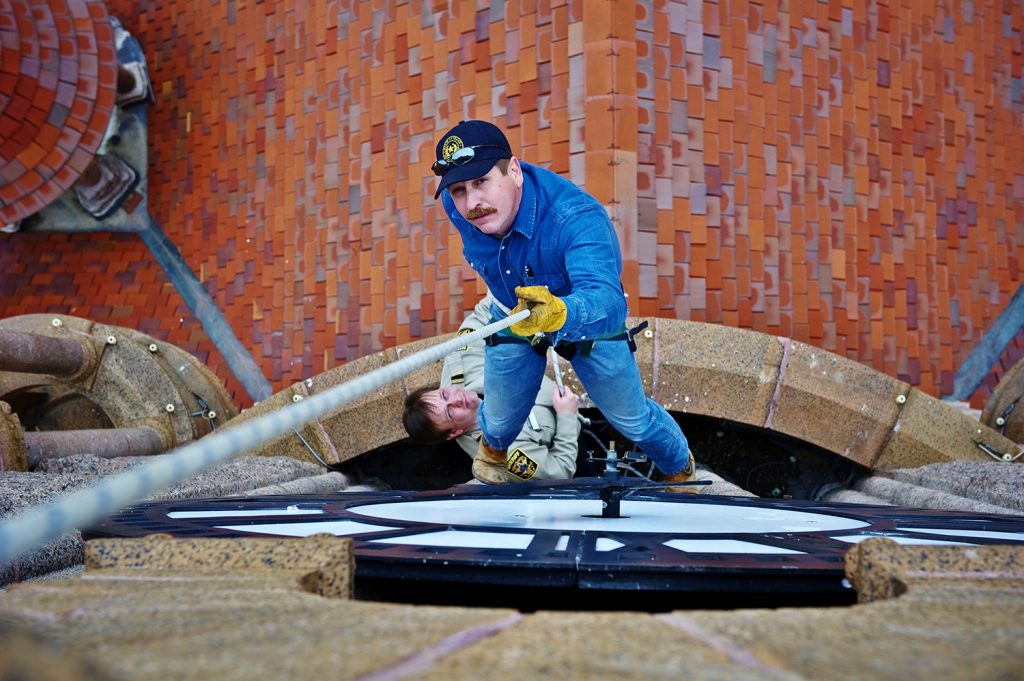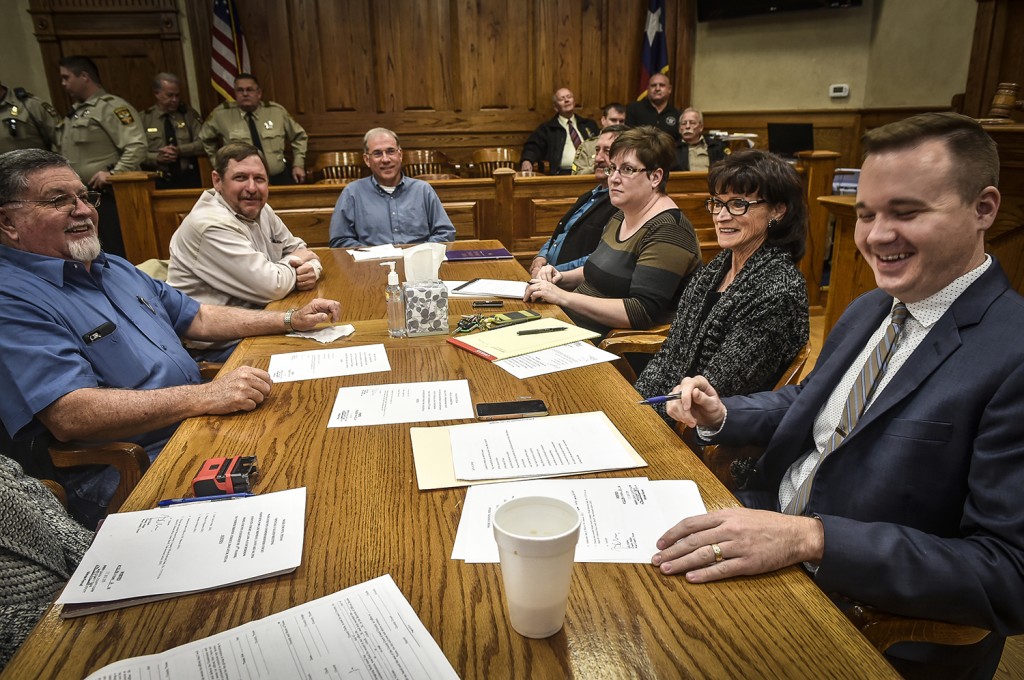Every so often, County Progress asks our distinguished Judges and Commissioners to allow us a glimpse into their public lives, giving us a fresh appreciation for the myriad of roles and responsibilities they shoulder every day. Our thanks to Wise County Commissioner Kevin Burns for taking the time to visit with us.
Wise County Commissioner Kevin Burns
History:
In late 2000, a couple of Wise County Commissioners came to my business to visit with me about running for Commissioner, as one of them was wishing to run for the then-open seat for County Judge. I scoffed at the idea at first. My business was just becoming successful after more than half a decade of investment of time and sweat. I was honored that they were speaking to me about the office, but I didn’t give it a great deal of thought. Others came by and encouraged me to consider running, and eventually I inquired about the duties and responsibilities. After I committed to run, my Precinct 2 Commissioner decided not to run for Judge. It was a tough decision to run against my Commissioner. He was and is a friend and an honorable man, but I had already committed to others to run and had to go through with it. He told me later it was the best favor anyone had given him. It took me a little while to understand that, but I can see the humor in that statement now.
I had been employed as a tractor and automotive mechanic and a business manager at a tractor dealership, and I had spent a decade as a trade and industrial education instructor at Decatur High School. I was then self-employed in a multifaceted automotive business prior to running for Commissioner. Throughout my life, I have supplemented my income as a small farmer and rancher, or maybe I supplemented my farming and ranching habit with full-time employment. Regardless, farming continues to have immeasurable therapeutic benefits. Somewhere during my adult life, someone encouraged me to be a volunteer fireman. I served 13 years with the Decatur Fire Department in various capacities, such as fire captain and training officer, with the last four years as chief. I guess I could say I still don’t know what I want to do when I grow up. I will, however, say this: None of my academics, vocations, or volunteer work fully prepared me for public office.
Is It What You Expected?
Having submitted budget requests to the Commissioners Court on behalf of volunteer fire departments, and having had a little interaction with the County Judge in his budget process, I had a little idea about what to expect during Commissioners Court; however, I had no idea what a typical day as a County Commissioner might bring. With 340 miles of road to maintain in Precinct 2 and only about 100 miles paved, I thought I would be able to spend many peaceful hours in the cab of an air-conditioned maintainer blading roads. That dream quickly faded on my first day. My foreman told me exactly which constituents would be in the office in precisely which order they would arrive requesting or demanding some kind of repairs or relief to issues we had no budget for and/or no legal authority to remedy. Even though the previous Commissioners Court sent me to a conference early to “learn the ropes,” it was very frustrating to have to deny or delay responses to requests by constituents. I often say that being a Commissioner is the most rewarding and the most frustrating job I have ever had. Most of the time those extreme thoughts and emotions occur in the same day. Unfortunately, I have to do a little office work, even though it doesn’t agree with me.
My initial plans were to inventory all equipment and roads and their conditions in the first couple of days. I quickly found that I could drive a significant portion of the roads in four days at an unsafe pace, but a good look at all of them took almost two weeks. I still try to drive them at least every month or two, but now rely on trusted constituents and employees to give me some of the conditions over the phone or radio.
I didn’t expect to be treated so well by most citizens in the county. It is truly a joy to serve them. I do my best to pass on accolades to employees and staff who deserve praise for their work, but I can never do that enough. I have also found that we could show up daily in front of a few homes and never do enough to satisfy them. Ha! 
I didn’t expect as much interaction with the developers within the county. During the incipient stage in the development of the Barnett Shale, we were experiencing rampant growth in both industry and housing. Our development rules had to be constantly reassessed to ensure delivery of essential services to those moving to Wise County for work or relocation away from growing cities. Our growth has thankfully slowed to a manageable rate.
I didn’t expect to host out-of-state groups for tours in the oilfield or help with the research and development of curriculum and workforce courses for universities in the Marcellus gas play. I was fortunate to host a group sponsored by and accompanied by the Bradford County Pennsylvania Commissioners in 2008, then many others in the following years. Since then, we have formed America’s Counties for Energy Independence. The organization provides a knowledge base of county personnel who have experience responding to the demands of gas play on county infrastructure and services to help other counties prepare for those activities. The group supports responsible and best/safe practices in the production of energy resources.
I didn’t expect to be as involved as an advocate in state or national policies or budgets. Wise County maintains 108 flood control structures in partnership with the U.S. Department of Agriculture (USDA)/Natural Resources Conservation Services. A direct benefit from those flood control dams and small watershed protection measures is the protection of roads and property in Precinct 2. It is easy to be an advocate for continued investment in those activities. I was appointed as chair of the National Watershed Coalition in 2011 and served for two years, and I continue to serve as past chair, educating members of Congress, congressional staff members, and USDA employees on the responsibility they continue to have to constituents throughout the nation to continue the engineering and financial support to prevent downstream flooding and improve water quality.
I didn’t expect to be a participant or an officer holder in the Conference of Urban Counties. Wise County certainly does not have the population for membership in the Urban Counties organization, but we are contiguous to the Dallas-Fort Worth Metropolitan Statistical Area and face the same growth trends as the Metroplex. I have served as education chair in the past and will serve as treasurer this year.
I appreciate the opportunity to serve in these capacities and share the collective voice in state affairs that a county of our size would not otherwise have.
I didn’t expect to travel to New York City to present a prospectus on Wall Street to get a bond rating on a joint education project between Wise County and Weatherford College; that was definitely a stretch for this country boy! A college maintenance tax was passed by Wise County citizens in 2007, and I was appointed as owner’s representative responsible for the construction of an almost 100,000-square-foot structure that has the capacity to serve as a college campus for up to 2000 or more students in the future.
My biggest challenge is time management. In the past, my biggest challenge was fairness in the services delivered by county employees, specifically paving roads. It is easy to say, “Squeaky wheel gets the grease,” but that is not a fair way to determine a schedule for improvement and maintenance of roadways and facilities. It is extremely hard to tell a person “No” when they are asking to have their road paved next. We started by spreading the work around between communities as much as possible so very rural areas would get some improvements, but my foreman and I determined that traffic count would be the easiest way to justify the schedule. It is tough to tell a person who has been paying taxes on property for a lifetime that they have to wait years to see any improvement to a dusty road, but traffic has to be the determining factor. We are fortunate in Precinct 2 to only have a dozen or so miles that are still gravel, and we hope to get 100 percent seal coated or paved in the 2016 paving season. It has been a long time coming, but we see a light at the end of that tunnel. Another one of my biggest challenges is paperwork. I am extremely blessed with my foreman Monty Nivens, a conscientious and dedicated man who does 99 percent of the things that I do not enjoy…most of the office work.
Balancing a schedule between spending time in the shop on maintenance of machinery, going out with the crew to improve roads, driving to check on complaints, and scheduled and unscheduled meetings is my biggest daily challenge. Regarding the Commissioners Court as a whole, our biggest challenge is meeting the safety and security demands and concerns of citizens within a reasonable budget. I am blessed with a like-minded group of Commissioners and staff who are dedicated to that purpose.
Favorite Part:
My favorite part of being a County Commissioner is meeting people throughout the county, throughout the state, and throughout the country,  and meeting their needs if possible. I tell my employees to empower themselves to deliver service to constituents if it is legal, moral, ethical and affordable while they are out on the road. Of course the road hands are conservative, careful and usually ask prior to doing anything in the right of way, but that is okay because I then get to interact with our citizens, which offers me the opportunity to get to know my neighbors. I hear about family history, what has happened on the land, where my constituents are from, and what shapes them, and that helps shape me. My wife will tell you that I have a severe case of Attention Deficit Disorder, so I guess I will have to admit that I enjoy the variety of tasks, as well.
and meeting their needs if possible. I tell my employees to empower themselves to deliver service to constituents if it is legal, moral, ethical and affordable while they are out on the road. Of course the road hands are conservative, careful and usually ask prior to doing anything in the right of way, but that is okay because I then get to interact with our citizens, which offers me the opportunity to get to know my neighbors. I hear about family history, what has happened on the land, where my constituents are from, and what shapes them, and that helps shape me. My wife will tell you that I have a severe case of Attention Deficit Disorder, so I guess I will have to admit that I enjoy the variety of tasks, as well.
As I said earlier, the job of County Commissioner is the most rewarding job I have ever had as well as the most frustrating, but the rewards far outweigh the frustration. I am able to show up to work at 7:00 a.m. in a t-shirt most days, change into a collared shirt for a meeting later in the day, change into a suit if I absolutely have to for some other function, then end my day in a t-shirt with the crew if possible. I can advocate for our issues in Austin or Washington, D.C., if the end results will warrant the expense of travel, or I can fill potholes if my time allows. I love serving in any capacity, but if a small part of it can be in the sunshine, that is all the better.
















